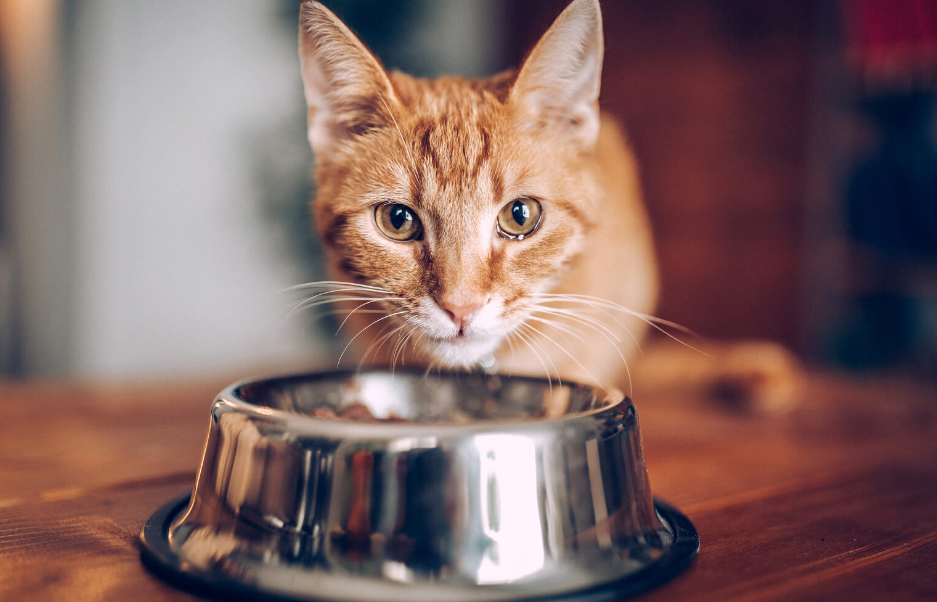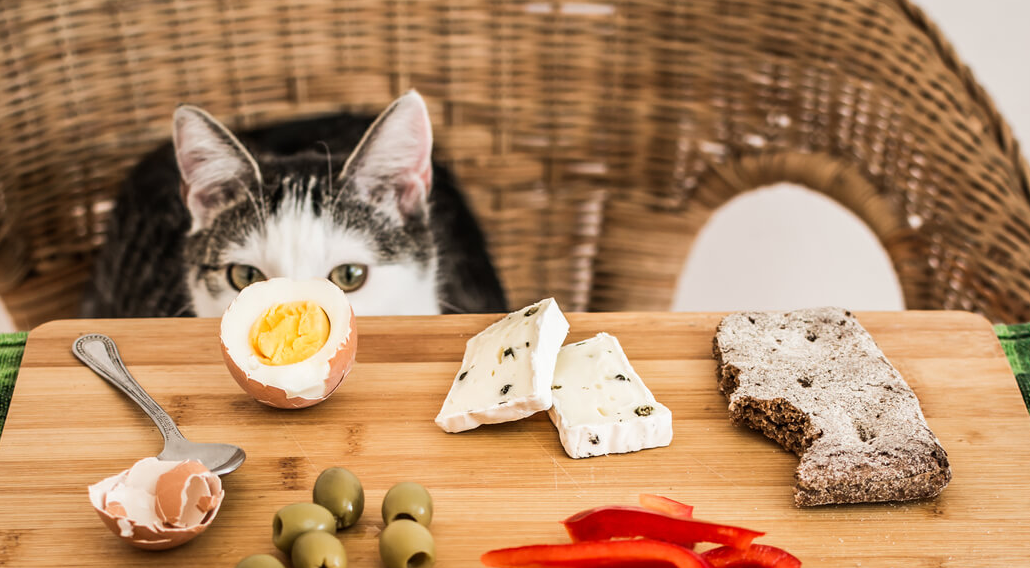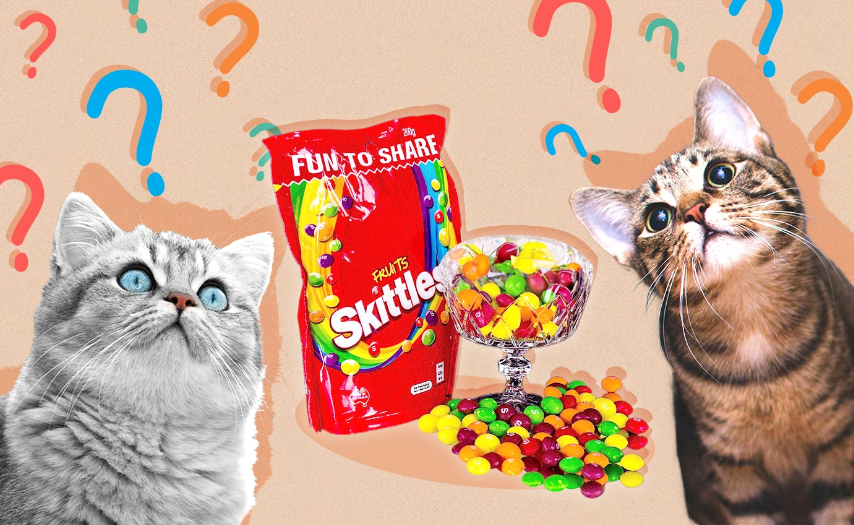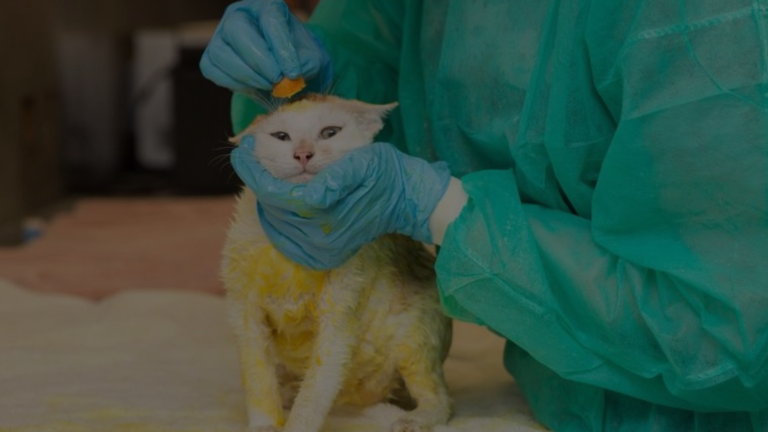Cats are notorious for their curious nature, often getting into mischief by exploring things they shouldn’t. And let’s face it, those brightly colored Skittles can be tempting for humans and feline friends. But the question remains: can cats eat Skittles? The answer, unfortunately, isn’t as simple as a yes or no.
Key Takeaways:
- Skittles are not recommended for cats due to their lack of nutritional value, potential toxicity, and choking hazards.
- If your cat accidentally eats a Skittle, monitor them closely and contact your vet if they show any concerning symptoms.
- Healthy alternatives to satisfy your cat’s cravings include commercial cat treats, cooked chicken or tuna, catnip, and interactive toys.
- Keeping Skittles and other human treats out of your cat’s reach is crucial for their health and well-being.
Why Skittles Are a No-No for Cats
While a single Skittle or two won’t cause immediate harm to your cat, it’s best to err on the side of caution and avoid giving them these sugary treats altogether. Here’s why:
Lack of Nutritional Value
Cats are:
- Obligate carnivores.
- Their bodies are naturally adapted to digest meat.
- Not sugary treats like Skittles.
These candies offer zero nutritional value for your feline friend, and the high sugar content can disrupt their digestive system, leading to:
- Upset stomach: Vomiting, diarrhea, and gas are common signs of digestive distress in cats who consume sugary foods.
- Weight gain: The empty calories in Skittles can contribute to weight gain, putting your cat at risk for obesity-related health issues like diabetes and heart disease.
- Dental problems: Sugar can promote the growth of bacteria in your cat’s mouth, leading to cavities and other dental problems.

Potential Toxicity
While Skittles themselves aren’t inherently toxic to cats, some ingredients can be harmful:
- Xylitol is a highly toxic artificial sweetener for cats, which can lead to seizures, liver failure, and even death. Although Skittles do not contain xylitol, it is essential to be aware of this potential danger in other candies or sugar-free products.
- Although artificial colors and flavors are safe for humans in small amounts, they can cause stomach irritation and allergic reactions in cats.
Choking Hazard
Small, hard candies like Skittles pose a choking hazard for cats, especially kittens who cannot chew them properly.
What should I do if my cat eats Skittles?
Your feline friend snuck a Skittle? Here’s the quick scoop:
- Relax: A single Skittle isn’t likely an emergency unless your cat gobbled a whole bag.
- Monitor: Watch for vomiting, diarrhea, or unusual behavior for a few hours.
- Call the vet: If your cat ate a lot of Skittles or shows any concerning symptoms, don’t hesitate to call your veterinarian. They’ll advise you on the best course of action.
- Prevention is key: Keep Skittles and other human treats out of your cat’s reach. Opt for cat-approved snacks like commercial treats or cooked chicken.
Alternatives to Satisfy Your Cat’s Cravings
If your cat seems interested in your Skittles, don’t worry! There are plenty of safer and healthier ways to satisfy their curiosity and cravings:

- Commercial cat treats: Look for treats specifically formulated for cats and made with high-quality ingredients like meat or fish.
- Small pieces of cooked chicken or tuna: These lean protein sources are a delicious and healthy treat for your cat.
- Catnip: This natural herb is a safe and stimulating treat for most cats.
- Interactive toys: Engage your cat’s natural hunting instincts with puzzles or feather wands.
For personalized advice on your cat’s health based on their needs and sensitivities, it’s best to consult a veterinarian.
Additional Tips
- Keep Skittles and other sugary treats out of reach of your cat.
- If you suspect your cat has ingested Skittles, it’s essential to keep a close eye on them for any signs of illness and contact your veterinarian immediately.
- Educate other family members and guests about the dangers of feeding human food to cats.

Ensuring your feline friend’s health requires understanding risks and providing healthy alternatives for a long life.
Resources & References
Recommended Articles:
FAQs about Cats and Skittles
Can a single Skittle harm my cat?
While unlikely to cause immediate harm, a single Skittle isn’t ideal. The high sugar content can disrupt digestion, and potential artificial ingredients could trigger sensitivities. Opt for healthy cat treats instead.
What are the risks of cats eating Skittles?
Upset stomach, weight gain, dental problems, and choking hazards are common concerns. Certain ingredients like xylitol (not in Skittles) can be highly toxic.
Are there any safe alternatives to Skittles for cats?
Absolutely! Commercial cat treats, small pieces of cooked chicken/tuna, catnip, and interactive toys can satisfy their cravings safely and healthily.
My cat ate a Skittle. What should I do?
Monitor them closely for signs of illness like vomiting, diarrhea, or lethargy. If concerned, contact your veterinarian immediately.
How can I prevent my cat from eating Skittles?
Store candy securely and educate family/guests about not feeding human food to cats. Engage your cat with stimulating toys and healthy treats to redirect their attention.







